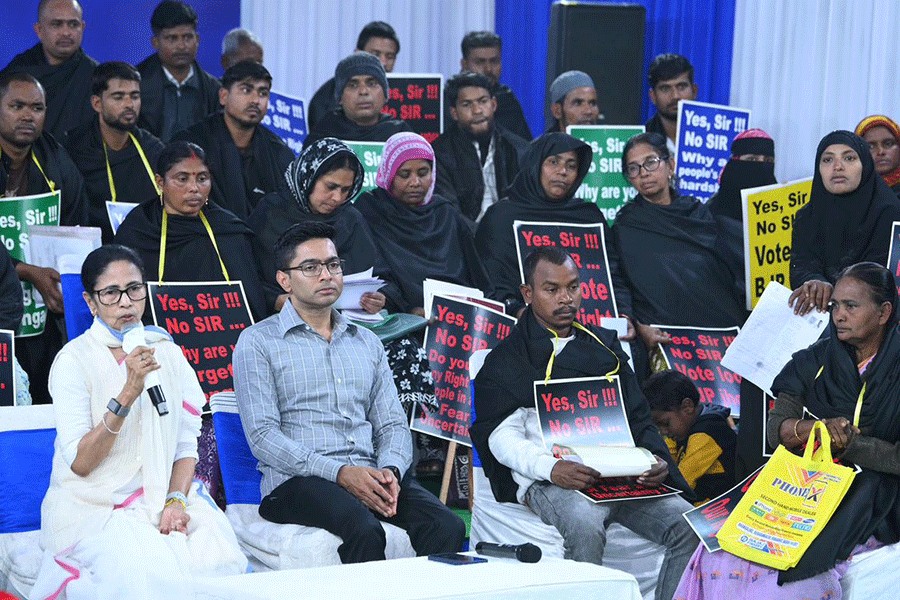Shared table
Sir — A Michelin-starred restaurant in Mexico City is letting people eat what they like and pay what they can. The premise sounds utopian, yet Masala y Maíz has shown that generosity comes with its own dividends. On designated days, the restaurant opens its doors on a first-come-first-serve basis and trusts diners to decide the value of a meal. In a city marked by economic inequality, it becomes less a business tactic and more a social experiment in hospitality. The model is spreading across South America and it shows that the true value of hospitality may not be in revenue but in rediscovering what a meal does best: draw people together, seat them side by side, and remind them of the power of being part of a community.
Jang Bahadur Singh,
Jamshedpur
Poor planning
Sir — The floods in Punjab reflect a disaster magnified by inadequate planning. The state government convened the annual flood-preparedness meeting a full four months late on June 5, offering just 17 days to act before the monsoon struck on June 22. Such a delay made effective preparation nearly impossible. The failure to clear drainage systems despite a preparedness guidebook released in May reflects deep institutional inertia. That said, unprecedented rains and dam overflows posed immense challenges that may have overwhelmed even timely planning.
Avinash Godboley,
Dewas, Madhya Pradesh
Sir — Punjab’s failure to implement the suggestions of a flood-preparedness guidebook released in May signals a systemic breakdown. Key tasks such as clearing weeds and blockages in drainage systems were ignored. Funds were made available but deployment timelines were unrealistic given bureaucratic delays. Storage levels in the Bhakra, Pong and Ranjit Sagar dams reached critical thresholds while inflows remained heavy, limiting the effectiveness of the few measures that were implemented. Such unforeseen events will become increasingly common because of climate change. The state needs to go to the drawing board to prepare for the future.
Jayanta Datta,
Calcutta
Sir — Attributing blame for the floods solely to the Punjab government would overlook the pressure from extreme monsoon rains and dam inflows. Inflows from Himachal Pradesh filled major dams to capacity, forcing discharge that worsened flooding in downstream areas. That situation created circumstances where even timely releases might not have averted overflow. Nevertheless, the delayed meeting and slow preparations compounded the risk instead of mitigating it.
Jahar Saha,
Calcutta
Sir — In Punjab, civil society and political actors mobilised relief effectively even as official systems faltered. Non-governmental organisations and volunteers supplied food, medicine and materials. Political leaders from both the state and Central parties participated in relief distribution. Such assistance is welcome and necessary but relief remains only a part of the response. Long-term rehabilitation, including compensation, land rebuilding and infrastructure reinforcement, demands sustained effort and accountability.
Gopalaswamy J.,
Chennai
Restore balance
Sir — The absence of women in recent judicial appointments to the Supreme Court points to a deeper structural issue (“Too few”, Sept 2). While the Collegium cites regional balance and seniority, gender is left out of consideration altogether. This is inconsistent with the court’s emphasis on women’s representation. The inclusion of women in constitutional courts cannot be left to chance or tokenism. Transparency in criteria, coupled with a written mandate for gender diversity, is needed to enhance women’s representation in the judiciary. Without such a framework, promises of equality remain aspirational while the Bench continues to reflect an imbalanced reality.
Bidyut Kumar Chatterjee,
Faridabad
Sir — Women judges contribute perspectives shaped by lived experience, which can illuminate how the law impacts different sections of society. Exclusion of women from the higher judiciary narrows this range of reasoning. Greater representation will not only improve judgments but also foster trust among citizens. When litigants see themselves being reflected in the Bench, confidence in the judicial system grows. The top court must therefore prioritise inclusivity as much as technical merit to remain credible.
Anwar Saeed,
Calcutta
Noisy nuisance
Sir — Noise pollution in Indian cities has become a public health emergency. Monitoring bodies, such as the National Ambient Noise Monitoring Network, collect data but fail to convert numbers into action. Permissible limits near hospitals and schools are breached almost daily, yet enforcement remains symbolic. The law is clear, the science is clear, but governance is absent. Unless State Pollution Control Boards coordinate with local authorities and traffic police, the rules will remain without teeth. Citizens deserve quiet spaces as a matter of constitutional right to a healthy life not a luxury.
Khokan Das,
Calcutta
Defiant stand
Sir — In Kochi, Canara Bank staff responded to a manager’s alleged beef ban by hosting a ‘beef fest’ right outside their office. This was less a meal break and more a masterclass in workplace protest. The attempt to dictate food choices has backfired spectacularly, leaving employees serving parotta with a side of defiance. Kerala has seen such beef festivals before so the menu should not surprise anyone. What is surprising is that a bank, usually known for fixed deposits, has now diversified into fixed food habits.
M. Jeyaram,
Sholavandan, Tamil Nadu










